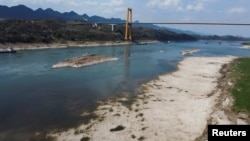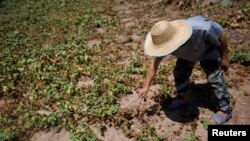With China’s biggest freshwater lake reduced to just 25% of its usual size by drought, work crews are digging trenches to keep water flowing to irrigate crops.
The dramatic decline of water coverage in Poyang Lake in the landlocked southeastern province of Jiangxi had otherwise cut off irrigation channels to neighboring farmlands in one of China’s key rice-growing regions.
But the crews using excavators to dig the trenches only work after dark due to the daytime heat, the official Xinhua News Agency reported.
High temperatures have sparked mountain fires that have forced the evacuation of 1,500 people in southwest China, and factories have cut production as hydroelectric plants reduce their output amid drought conditions.
The drought and heat have wilted crops and shrunk rivers including the giant Yangtze, disrupting cargo traffic and reducing power output.
Fed by China’s major rivers, Poyang Lake averages around 3,500 square kilometers (1,400 square miles) at high season, but has contracted to just 737 square kilometers (285 square miles) amid the recent drought.
As determined by water level, the lake officially entered this year’s dry season Aug. 6, earlier than at any time since records began being taken in 1951. Hydrological surveys before then are incomplete, although it appears the lake may be at or around its lowest level in recent history. Along with providing water for agriculture and other uses, the lake is a major stopover for migrating birds beginning to head south for the winter.
A wide swath of western and central China has seen days of temperatures exceeding 40 degrees Celsius (104 Fahrenheit), in summer heat waves that have started earlier and lasted longer than usual.
In the hard-hit city of Chongqing, department stores have delayed their opening to 4 p.m. Residents have been seeking respite from the heat in air raid shelters dating from World War II.
That reflects the situation in Europe and elsewhere in the Northern Hemisphere, with high temperatures taking a toll on public health, food production and the environment in general.








